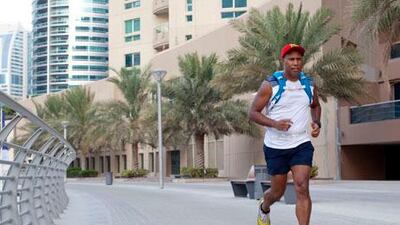ABU DHABI // Mark Henaway became a father when he was overweight, did no exercise and was well on his way to developing type 2 diabetes.
Seven years later, the 46-year-old is on a very different path – one that leads to a 250-kilometre, seven-day race across the Sahara desert.
His motivation, he said, was his son Ethan, whose birth was a turning point for Mr Henaway's health.
"It really started the day my son was born in April 2006," said the Dubai resident. "Not long after that, the doctor said that because I was significantly overweight, ate too many pizzas and burgers, didn't exercise and was in a particular ethnic group, I was at risk of type 2 diabetes in the coming years.
"That statement was a severe shock to the system, so I began a tidy up of my health and fitness because I want to grow old with my son, and some day I hope we will be able to participate in races together."
Type 2 diabetes is a metabolic disorder that is primarily caused by obesity and results in high blood glucose levels. Sufferers may have to be prescribed anti-diabetic medications or insulin, and routinely monitor their blood-sugar levels.
Mr Henaway, who is partly indigenous Australian and partly Ni-Vanuatu, was living in Brisbane, Australia, at the time of his doctor's advice and weighed 96.5 kilograms. He immediately began a new diet and started an exercise regime, which involved his newborn son.
"It consisted of walking a pram for 3km in the morning and again at night," he said. "It was good because it helped to reduce the weight slowly and progressively and my body was adjusting. I did it in stages."
The next milestone was a triathlon in 2008 on the Gold Coast, Australia, at which point he had slimmed down to 74kg. He now weighs 80 kilograms, much of it healthy muscle.
After four half-marathons, the next big test was the Dubai Marathon, which he completed in six hours in February.
"It was brutal but it was very enjoyable," said the engineer, who now works in Abu Dhabi designing traffic-management systems for Parsons International.
Thoughts of his son kept him going during the race.
"Before I did the marathon, I said, 'I'm doing it for you'. That was my motivator," Mr Henaway said. "He loves running as well now. He has been inspired. He does his swimming, and likes to go bike riding. I think he wants to do triathlon."
Now reformed, he hopes other people are inspired by seeing his progress on social media, particularly those of a similar age.
"Facebook is a great medium for advertising – you don't have to sit there and die and accumulate all sorts of health issues," he said. "You can get out and be healthy and run."
Mr Henaway said he found the sedentary lifestyle and high levels of type 2 diabetes in the UAE worrying.
"I look around and I see that it is like watching a movie in slow motion – seeing people eating unhealthily, not exercising and becoming more overweight."
He observes people following a similar unhealthy lifestyle to the one he left behind, particularly those approaching 40.
"I got to that point in my late thirties. You don't have to give up and say, 'this is the way you have to stay'. You can make the decision to turn your life around," he said.
The race across the Sahara is from February 15 to 22 next year, but it was not just the physical test that prompted Mr Henaway to take part.
"It is not even the challenge of running a race anymore. It is about the landscape, about culture, about history," he said. "It is about putting yourself to the test on top of all that. It is a seven-day boot camp. You get to meet some of the best athletes in the world."
The months before the marathon involve lots of preparation at the Dubai Marina and Nad Al Sheba cycle track.
Mr Henaway is supporting the Start Walking initiative of Abu Dhabi's Imperial College London Diabetes Centre.
The drive encourages individuals, groups and organisations across the UAE to take part by forming walking groups and holding events.
He will be helping out as a volunteer at some campaign events.
ecleland@thenational.ae

